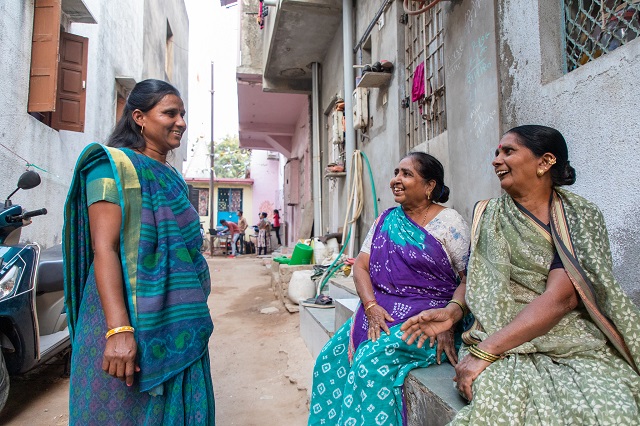
During the summers, in the crowded informal settlement she calls home in Ahmedabad, India, Meenaben would lay wet jute on the floor and hay on the roof of her home to lower the temperature inside. If she didn’t, her home would get so hot her husband would sometimes be hospitalized with heatstroke.
Meenaben’s home is made of building materials that trap heat; without air conditioning and insulation, her home can reach upwards to 45 degrees C (113 degrees F) inside. Extreme temperatures aren’t the only threat. During the monsoon season, Meenaben would watch rising flood waters destroy her neighbors’ homes, leaving fetid pools of water in their wake.
As the effects of climate change worsen, it is communities of women in slums, like Meenaben and her neighbors, who are hit hardest. Responsible for the upkeep of their homes and the health of their families, the additional tasks necessary to adapt to a changing climate — such as gathering water and protecting from the heat — are a burden for women. Furthermore, many women slumdwellers work at home; when climate impacts prevent them from doing so, their socioeconomic stability is put at risk.
Despite the threats they face, these women are disempowered from partaking in climate decisions at both a personal and political level. Limited in their movements, financial decisions and day-to-day activities because of their gender, they rarely participate in the municipal decisions that directly affect their lives.
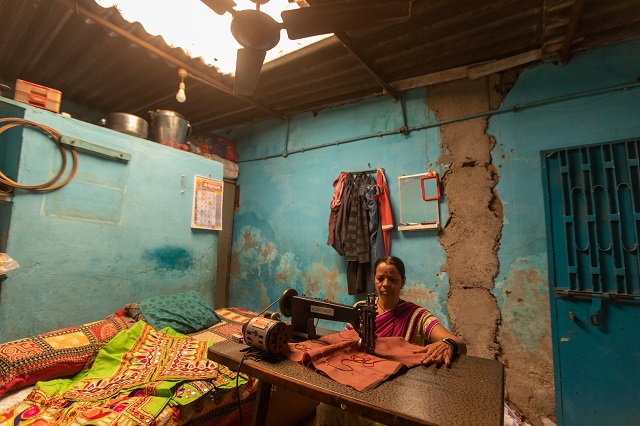
The Mahila Housing SEWA Trust (MHT), a finalist for the 2020-2021 Prize for Cities, which spotlights innovative approaches to simultaneously tackling climate change and urban inequality, is an organization dedicated to flipping this paradigm. It is creating climate champions from climate victims: women leaders who are empowered with knowledge, tools for change and a voice to bring bottom-up transformation to their neighborhoods, policymaking and beyond.
Empowering Women as Climate Champions
When a record-breaking heatwave hit Ahmedabad in 2010, an estimated 1,300 people died in one month alone. The deadly event was a wake-up call for the city and many local community organizations.
In 2013, the city announced its first Heat Action Plan, but MHT saw gaps between the solutions in the plan and the needs of slumdwellers on the ground. Soon after, MHT launched Women’s Action Towards Climate Resilience for the Urban Poor, a program to generate bottom-up climate change solutions and bridge the gap between slums and higher levels of governance.
The program relies on MHT’s women-led model: at the lowest level of organization, one woman represents one household in a slum, but there are also neighborhood and city-level representatives, rising all the way to the independent Vikasini Federation. The Federation, which operates independently from MHT, selects women — known as Vikasinis — to advocate for inclusive climate action at the city government level. Vikasinis are essential to MHT’s model of working in slum communities, as they have relevant life experiences and are able to connect with and mobilize other women to participate in programs and advocacy.
MHT understood that the first barrier to building climate resilience in slum communities was a lack of knowledge around the causes and impacts of climate change. For many slumdwellers, climate change is an inexplicable “act of God” that they are powerless to address. To help build local understanding of climate risks and establish women as agents of change, MHT developed a series of trainings led by a group of technical experts — and later, by Vikasinis who had been through the trainings themselves.
Trainings are designed to be engaging and accessible to women of all education levels. They teach about climate change and its connection to human activity, such as the relationship between increased motor vehicles, greenhouse gas emissions and air pollution. They also explain how climate change impacts can affect households through extreme heat, decreased productivity and illness. Women are then trained to disseminate the information to other women and their communities.
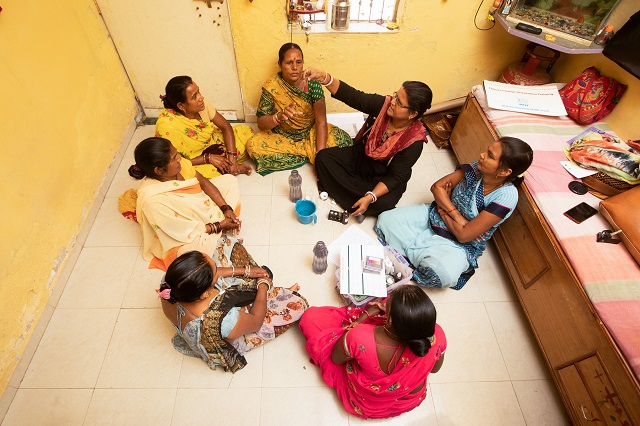
The women-led trainings are complemented by data-collection campaigns. Often, municipal governments have very little data on what is happening in poor communities and other informal settlements. MHT mobilizes women and children to collect evidence of climate risks, such as water quality and disease vectors. For example, MHT’s tests after monsoon season showed increased levels of water contamination after flooding, leading many households to invest in water purifiers. The data also enabled the Vikasinis to successfully advocate for the city to invest in improved water systems, including clearing drains, paving streets and connecting water and sewer lines.
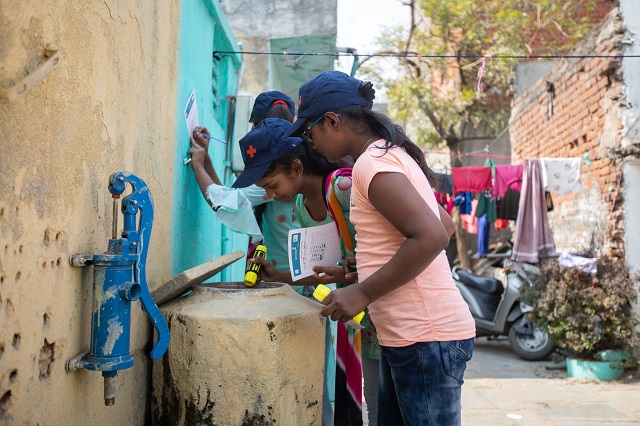
Innovative Climate Solutions Are Transforming Lives
As the program has matured, Vikasinis have begun hosting demos of pro-poor, climate-resilient solutions to show what’s possible, oftentimes using their own homes as examples. Solutions include water scarcity and quality interventions, such as water purifiers and rainwater-harvesting systems, as well as cool-roofing solutions.
Many households have been particularly receptive to cool-roofing. As Meenaben described, slum residences can become excruciatingly and dangerously hot. MHT’s network of climate champions is helping spread solutions that are affordable and applicable: white paint, a lower-cost intervention, can be applied to existing roofs; ModRoofs, a higher-cost option, involve replacing the existing roof with a still (relatively) cheap custom material that is stronger, cooler, waterproof, fireproof and made largely of recycled materials.
“The ModRoof you see right now was once my dream,” Meenaben said to WRI. “After my climate change training, I learned about Modroof… after the Modroof demonstration the temperature was measured. It was down by 3 to 4 degrees C (6 to 8 degrees F). Then I took up a loan and installed a Modroof in my home.”
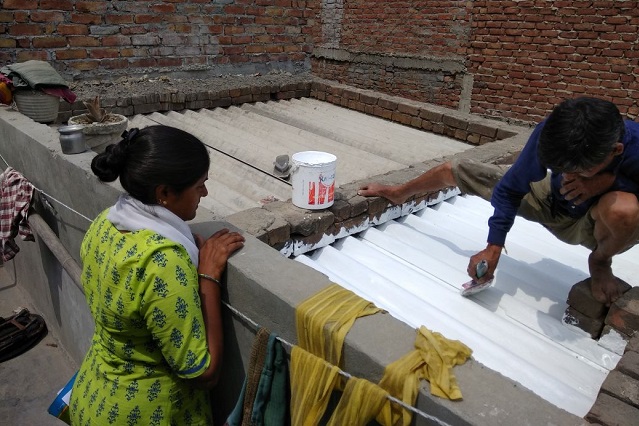
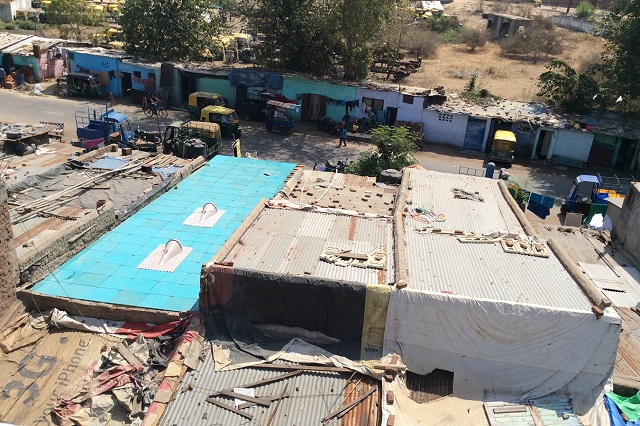
Women Slumdwellers Are the Newest Voices in Climate Governance
MHT’s growing network of empowered women has produced physical changes, but also affected the way the city of Ahmedabad makes decisions.
Vikasinis were invited by the city to help develop the city’s 2017 Heat Action Plan, 2019 Monsoon Action Plans and a citywide Cool Roof Policy, bringing new voices and new solutions to bear. MHT’s advocacy has led the city to install more than 17,000 cool roofs in affordable housing units, and the Cool Roof Policy is expected to scale up the implementation to even more households. Monsoon Action Plans lay out specific strategies to prepare for floods — like regularly clearing drainage channels — and respond to inundation, benefiting up to 50,000 people across the city.
While the changes to the city’s climate action planning are remarkable, perhaps the most notable attribute of MHT’s work is the gradual and sustained approach it adopted to empower women and increase their personal and communal capacity to advocate for change.
“If a woman is empowered, the entire benefits of the empowerment goes to the family, especially to their children,” said Bijal Brahmbatt, director of MHT, to WRI. “And they bring about an inter-generational change, which is very, very relevant, especially for climate change.”
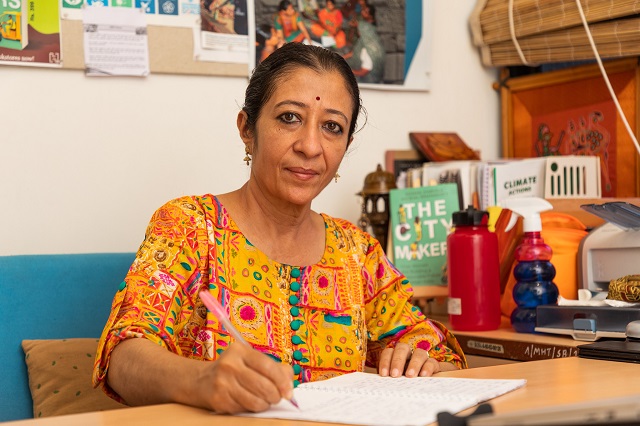
Through these interactions, thousands of women have been empowered to navigate formal systems of governance to advocate for themselves and their communities, morphing from beneficiaries to active collaborators in the city’s climate action planning.
MHT’s model continues to expand, now reaching 125,000 women across six additional cities beyond Ahmedabad, in three countries. It is an internationally recognized example of building grassroots climate resilience. As Bhanuben, a Vikasini, explained, “The more women join us, the more their lives would change.”
The 2020-2021 Prize for Cities celebrates innovative approaches to tackling climate change and urban inequality together, showing how to live and thrive in a changing world. From five finalists, Sustainable Food Production for a Resilient Rosario, a project by the municipality of Rosario, Argentina, was announced as the grand prize winner on June 29, 2021.
This article was originally published on WRI’s Insights.
Madeleine Galvin is a Research Analyst on the Prize for Cities team at WRI Ross Center for Sustainable Cities.
Schuyler Null is Communications Manager for WRI Ross Center for Sustainable Cities.
Anne Maassen is the Global Lead for the WRI Ross Center Prize for Cities.








